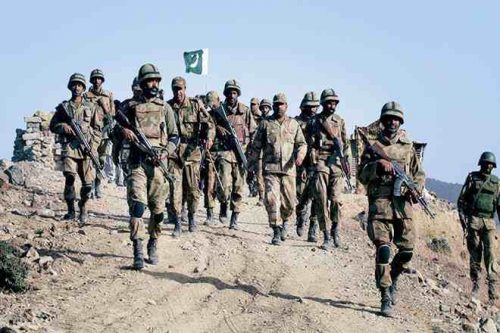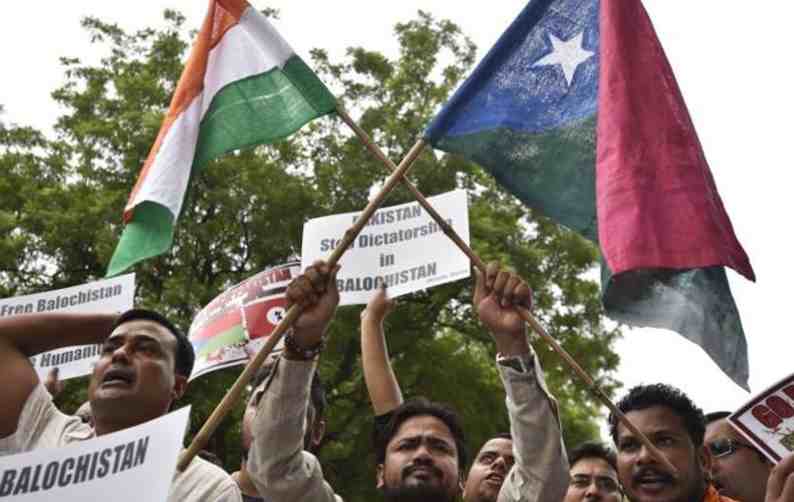India has raised the issue of atrocities on Baloch people by Pakistani machinery
Geneva, September 26: Baloch leaders along with Ryszard Czarnecki, Vice President of the European Parliament and Canada-based Executive Director of Baluch House, Tarek Fateh, participated in a candle-light vigil outside the UNHRC in Geneva, Friday, in memory of Baloch nationals who had lost their lives due to Pakistan’s ‘Kill and Dump Policy’ in Balochistan.India has raised the issue of atrocities on Baloch people by Pakistani machinery
Speaking to the media, Mr Czarnecki said that the Baloch problem was not just an internal issue of Pakistan since, as a partner of the European Union.
He said that Pakistan had the responsibility to ensure that there were no human rights violations in the country and added that the European Union silence on the issue was a shame – “our silence would be our shame”.
Mr Fateh noted the abuse of Baloch people and secularism in the region, by the Pakistani Army.
He called on the international community to put pressure on Pakistan to allow journalists to Balochistan so that the world would be able to see the stark reality.
Mehran Marri, Baloch Permanent Representative to the UN, demanded the withdrawal of the Pakistani forces from Balochistan, responsible for the ‘Kill and Dump’ policy against Baloch citizens.
Brahumdagh Bugti, President, Baloch Republican Party, said that the Pakistani government had for long escaped scrutiny of the international community, for the atrocities committed against the people of Balochistan.
However with Indian Prime Minister Narendra Modi raising the issue, it had now caught the attention of the world. He hoped that the Baloch people would continue to receive this support from India.
The silent vigil was organised to highlight the human rights atrocities by the Pakistani establishment.
Operation Zarb-e-Azb to ensure terrorists to move to Syria to join ISIS
Earlier, On September 21, the International Forum for Rights of Pakistan hosted a seminar at the UNHRC in Geneva on the human rights violations caused by the Pakistani Army, under the garb of Operation Zarb-e-Azb.
Dr. Faiz Modh Zaland, while speaking at the event, stated that the Pakistan Army and its intelligence agencies had victimized the Pashtuns who were living in North and South Waziristan.
He stated that the military operation Zarb-e-Azb had only destroyed the homes of the local people and not the terrorists, unlike the claims of the Pakistani government.
Although the Pakistani Army projected the operation as a success, it was actually one of the worst humanitarian crisis witnessed, forcing more than 2 million people from their homes.

Tarek Fateh in his statement informed that the Pakistan Army had started the operation to kill its own citizens in order to ensure the smooth exit of nearly 2000 Central Asian and Chechen terrorists to move to Syria to join the ISIS.
He warned that if not checked, Pakistan would become a threat to the citizens of Europe and America.
Exploitation in the China-Pakistan Economic Corridor (CPEC)
Another international organisation, Friends of Gilgit Baltistan, in a seminar on September 19, on the sidelines of the 33rd UNHRC session in Geneva, highlighted the exploitative nature of the China-Pakistan Economic Corridor (CPEC) in Gilgit Baltistan and Pakistan Administered Kashmir.
Paulo Casaca, Executive Director, South Asia Democratic Forum opined that though the government harped on the expected economic benefits of the CPEC, little attention was given to the fact that the CPEC would fail to provide economic benefits, including jobs, to the locals and instead only enrich a few.
He stated that CPEC had become more of a project championed by the Pakistani government and its military to divert attention from all the failures of the civilian government in all other areas including human rights.
Mr Casaca also raised the issue of Pakistan’s support to cross border terrorism and that there was an immediate need to stop it, otherwise it could impact the security of not only South Asia but also the world.
Junaid Qureshi, prominent Kashmiri human rights leader raised the issue of the illegal nature of the CPEC as it passed through disputed territory.
He expressed strong reservations about the large Chinese investment in the area, which is part of the undivided State of Jammu and Kashmir. He opined that China, by investing in projects in this disputed area, was also becoming one of the players in the dispute, which was not acceptable to the people of Kashmir.
He noted that while in India, people were free to express opposition to policies; in Pakistan however, leaders like Arif Shahid were being shot dead by the State machinery.
Plight of Pakistani Minorities Discussed in the United Nations
Fulvio Martusciello, Member, European Parliament speaking at an event titled “Plight of Pakistani Minorities” at the 33rd session of the UN Human Rights Council, highlighted Pakistan’s discriminatory laws against minorities and use of extremist groups as proxies to target minorities including the Christains, Hazaras, Ahmadiyas, Hindus and Balochs.
He expressed deep concern regarding the growing intolerance in Pakistani society, a phenomenon aggravated by the actions of the Pakistani government.
Mario Silva, Executive Director, International Forum for Rights and Security, was of the view that the State of Pakistan should be held responsible for the genocide against the Baloch people.
Referring to the wave of killings in the region, that included educators, journalists, lawyers and students, and the ‘Kill and Dump’ policy of the Pakistani security forces and intelligence, he stated that many of these people were killed for having spoken out against the on-going persecution in the province.
Minority communities have been fleeing Pakistan to avoid persecution.
On April 16, this year, about 11,500 Pakistanis, mostly Christians, were seeking asylum in Thailand.
Thousands of Pakistanis, mostly Hindus and Sikhs had moved to India in the hope of securing Indian citizenship.
Dr Rubina Greenwood, human rights activist for Sindhis in Pakistan, called on the international community to restrict aid/loans to Pakistan till it improved laws and made institutional changes on issues related to discrimination of religious minorities.
She called for nominating a Special UN Rapporteur who would investigate atrocities against Shias, Hindus, Christians, Ahmadi Muslims in Pakistan.
Noel Ahmadi
(Noel is a freelance coloumnist based in Europe)

